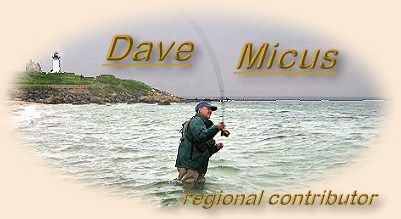|
In a Boston Globe Sunday editorial, columnist
Jeff Jacoby declared that fishing for sport (catch
and release) is cruel and inhumane. It seems an
odd axe to grind on the Sunday editorial pages of
a major metropolitan newspaper, but in his defense
Jacoby probably has to write three columns per week
and at least he doesn't fabricate or plagiarize
like his former colleague Mike Barnicle.
Jacoby relies on the usual clichés, the ones so
well honed by PETA, saying we would never hook a dog,
or a bird, or any other animal the way we hook fish.
And that's true, but we also wouldn't put a fish in
a cage and expect it to sing, or take a fish hunting
and expect it to point game. It's apples and oranges.
And though Jacoby's article is focused on fishing and
gives hunting a pass, the logic employed is a
double-edged sword. We wouldn't hunt dogs or parakeets,
either, and to selectively apply these analogies is
hypocritical.
But Jacoby's article, per se, doesn't bother me.
I don't think I'm alone when I say that I've come
not to expect much from the Globe and its columnists.
What does bother me in the article are the quotes
from Ted Kerasote, a hunter and outdoorsman who I
here-to-fore respected. The irrationality of one
statement by Kerasote I find particularly irksome:
"Needless to say, if you think about this relationship
[fish and fisherman] carefully, it's not a comforting
one, for it is a game of dominance followed by cathartic
pardons, which...is one of the hallmarks of an abusive
relationship."
The use of the word 'relationship' in this context is
baffling. Am I forming a relationship with the fish
I catch? According to Random House, a relationship
is 1. The state or fact of being related, 2. Kinship,
or 3. A sexual involvement. None remotely apply. So
what exactly is Kerasote talking about? The use of
'abusive relationship' only further muddies the waters.
I could be silly and ask Kerasote if I should woo the
fish I seek with candy and flowers, or I could be mean
and suggest that Kerasote, as a hunter, must subscribe
to the O.J. relationship model-stalk and kill the
object of your desire. But with that out of my system,
I will try to explain the value of catch and release,
though it surprises me that I need to do so.
I subscribe to the catch and release ethic, but I'm
not extreme in my views. If you want to eat the fish
you catch, that is your prerogative. And while I don't
hunt, I have no problem with hunting. I enjoy reading
hunting stories much more than fishing stories, and
anyone who has seen a deer slowly dying of chronic
wasting disease has to realize that hunters serve a
valuable purpose. So I'm not taking the moral high
ground because I release my fish.
I know two fly fishermen who caught 48-inch striped
bass on the fly from shore. Considering the size of
the tippet the fishermen were using, either fish
could easily have been a world record. Each of these
fishermen let their fish go. Why would they let the
fish of a lifetime go? A 48-inch striped bass is over
16 years old, and so displays a strong survival instinct.
A fish this size is likely to be a female, and could
produce over 3,000,000 eggs a season. Is this fish
more valuable on the wall of a den? On a bar-b-que?
Or in the gene pool? Through catch and release we
assure the propagation of the species.
Just a few short years ago the striped bass was
on the verge of extinction due to the numbers of
fish caught and killed by sportsman and commercial
fishermen. It was only the implementation of a
moratorium, followed by a size and creel limit
that brought the striper back to the somewhat
healthy population of today. What would have
happened if we adhered to Jacoby's and Kerasote's
philosophy?
Once while fishing a productive pool on the Ipswich
River I met a fellow fisherman. I asked how he had
done and he held up a stringer with three good-sized
trout. "Nice fish," I commented, and he asked "Do
you want them?" Without giving it any thought,
without really wanting or needing the fish, he had
killed them. I saw him a week later at the same pool,
and neither of us caught any fish. "I don't understand
it," he lamented, "I've taken my limit here every day
this week."
The philosopher Jose Ortega y Gasset wrote, "To
the sportsman the death of the game is not what
interests him; that is not his purpose. What
interests him is everything that he had to do
to achieve that death-that is, the hunt." Ortega
y Gasset goes on to say that the death is essential
because it is the culmination of the hunt.
But I'd suggest that Ortega y Gassett refers to
the capture, which, in hunting, is synonymous
with death, as the conclusion of the hunt.
Fishermen have the luxury of enjoying the
capture, but releasing the quarry. Those of
us who choose to release our fish do so not
to salve a guilty conscious or to feel morally
superior. We do so to assure that our children,
and our children's children, will have the same
opportunity to fish and enjoy the outdoors that
we have been blessed with. Kerasote can call
that an abusive relationship; I'd call it
common sense. ~ Dave
About Dave:
 Dave Micus lives in Ipswich, Massachusetts. He is an
avid striped bass fly fisherman, writer and instructor.
He writes a fly fishing column for the Port City Planet
newspaper of Newburyport, MA (home of Plum Island and Joppa Flats)
and teaches a fly fishing course at Boston University.
Dave Micus lives in Ipswich, Massachusetts. He is an
avid striped bass fly fisherman, writer and instructor.
He writes a fly fishing column for the Port City Planet
newspaper of Newburyport, MA (home of Plum Island and Joppa Flats)
and teaches a fly fishing course at Boston University.
|

 Dave Micus lives in Ipswich, Massachusetts. He is an
avid striped bass fly fisherman, writer and instructor.
He writes a fly fishing column for the Port City Planet
newspaper of Newburyport, MA (home of Plum Island and Joppa Flats)
and teaches a fly fishing course at Boston University.
Dave Micus lives in Ipswich, Massachusetts. He is an
avid striped bass fly fisherman, writer and instructor.
He writes a fly fishing column for the Port City Planet
newspaper of Newburyport, MA (home of Plum Island and Joppa Flats)
and teaches a fly fishing course at Boston University.